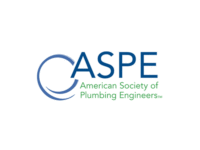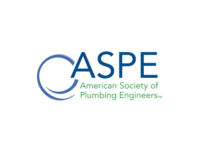In accordance with ASPE’s Procedures for Design Standard Development, ASPE announced the initiation of a project to develop a new standard on thermal disinfection system design.
ASPE 99-202x: Implementation and Management of the Thermal Disinfection Process in Domestic Hot Water Systems will provide guidelines to the health care and mechanical/electrical/plumbing engineering communities on approaches to optimally implement and manage the thermal disinfection process. Thermal disinfection is one of the primary Legionella mitigation methods used in health care today, and several plumbing manufacturers have developed products to facilitate implementing a thermal disinfection process, including balancing valves, master and point-of-use mixing valves, water heaters, fixtures, etc. This standard will provide direction on how to effectively implement and manage the thermal disinfection process utilizing these components.
Performing thermal disinfection in a domestic hot water system poses challenges on many levels, especially in an occupied health care facility. Patient and staff safety, implementation cost, management cost, responsiveness, optimized utilization of resources and proactive versus reactive thermal disinfection are examples of the many challenges facing the health care and engineering communities today, and this standard would help alleviate such concerns.
For more information on this proposed new standard, contact ASPE’s Director of Communications and Publications, Gretchen Pienta, at gpienta@aspe.org.
A Project Initiation Notification System (PINS) was published in Standards Action on July 15, with a PINS response end date of Aug. 14.



